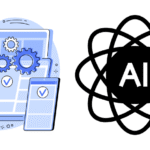 Hybrid Development Frameworks (HDFs) – Master hybrid app creation with top frameworks. These tools offer a mix of speed, adaptability, and cross-platform compatibility, essential for modern, responsive app development.
Hybrid Development Frameworks (HDFs) – Master hybrid app creation with top frameworks. These tools offer a mix of speed, adaptability, and cross-platform compatibility, essential for modern, responsive app development.
With the increasing demand for mobile applications that work across different platforms, hybrid development frameworks have become a popular choice for developers. They allow developers to build applications that can run on multiple platforms using a single codebase, saving time and resources.
However, with so many options available, choosing the right hybrid development framework for your project can be a daunting task.
Key Takeaways
- Hybrid development frameworks enable developers to build mobile applications that work across multiple platforms using a single codebase.
- Choosing the right hybrid development framework requires considering factors such as platform support, performance, community support, and learning curve.
- Hybrid development frameworks offer benefits such as faster development time, cost-effectiveness, and leveraging existing web development skills.
Understanding Hybrid Development Frameworks
Hybrid development frameworks enable developers to build mobile applications that work across multiple platforms. These frameworks offer a cost-effective solution to the challenge of building apps for different platforms, saving developers time and resources.
They combine the best of both worlds by leveraging web development technologies such as HTML, CSS, and JavaScript, while also accessing native device features through platform-specific APIs. This approach enables developers to create apps that look and feel like native apps, but are built with web technologies.
They offer several advantages over pure native development. In addition to reducing development time and cost, they allow developers to use their existing web development skills to build mobile applications. This means that developers do not need to learn platform-specific programming languages, such as Objective-C or Java, to develop native apps.
Types of Hybrid Development Frameworks
There are two types of hybrid development frameworks: web-view based frameworks and native shell-based frameworks.
Web-view based frameworks: These frameworks use a web-view container to render web technologies such as HTML, CSS, and JavaScript as a native app. Examples of web-view based frameworks include Apache Cordova and Ionic.
Native shell-based frameworks: These frameworks use a native container that wraps around web technologies to create a native app. Examples of native shell-based frameworks include React Native and Flutter.
Benefits of Hybrid Development Frameworks

They offer several benefits that make them a popular choice for mobile app development. Here are some of the key advantages:
- Faster development time: With hybrid development frameworks, developers can write code once and deploy it across multiple platforms, saving time and effort in the development process.
- Cost-effectiveness: Since hybrid development frameworks enable the use of a single codebase for multiple platforms, it results in cost savings compared to building separate native apps for each platform.
- Leverage existing web development skills: Developers can leverage their existing web development skills, such as HTML, CSS, and JavaScript, to build mobile apps using hybrid development frameworks.
- Consistent user experience: Hybrid development frameworks enable developers to provide a consistent user experience across multiple platforms, with the same look and feel for all users.
- Easier maintenance: With a single codebase, maintaining and updating the app becomes easier, as changes made to the code can be deployed to all platforms at once, reducing the maintenance effort and cost.
These benefits, along with others, make hybrid development frameworks an attractive option for businesses and developers looking for multi-platform hybrid solutions.
Popular Hybrid Development Frameworks
Choosing the right hybrid development framework is crucial for a successful cross-platform app development project. Here are some of the most popular hybrid development frameworks to consider:
| Framework | Description |
|---|---|
| React Native | Created by Facebook, React Native is a popular open-source framework that allows developers to build high-performance mobile apps for iOS and Android. |
| Flutter | Developed by Google, Flutter is a UI toolkit that helps developers create natively compiled applications for mobile, web, and desktop platforms from a single codebase. |
| Ionic | Ionic is an open-source framework that builds cross-platform mobile apps using web technologies. It offers a wide range of pre-built UI components and a powerful CLI. |
| Xamarin | Xamarin is a Microsoft-owned open-source framework that allows developers to build native mobile apps for Android, iOS, and Windows using C# and .NET. |
Each framework has its advantages and disadvantages. For example, React Native offers excellent performance and a large community, while Flutter provides fast development time and easy customization. Ionic is ideal for building hybrid apps that look and feel like native apps, and Xamarin provides seamless integration with Microsoft tools.
React Native
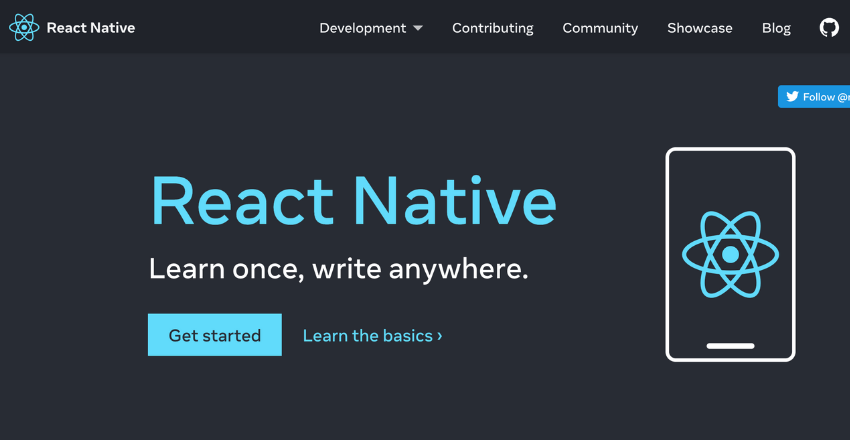
React Native allows developers to use JavaScript to build mobile apps that look and feel like native apps. It uses a virtual DOM to provide a smooth and responsive user interface and supports hot reloading for faster development times. React Native also offers a large community and a vast number of third-party libraries and tools.
Flutter
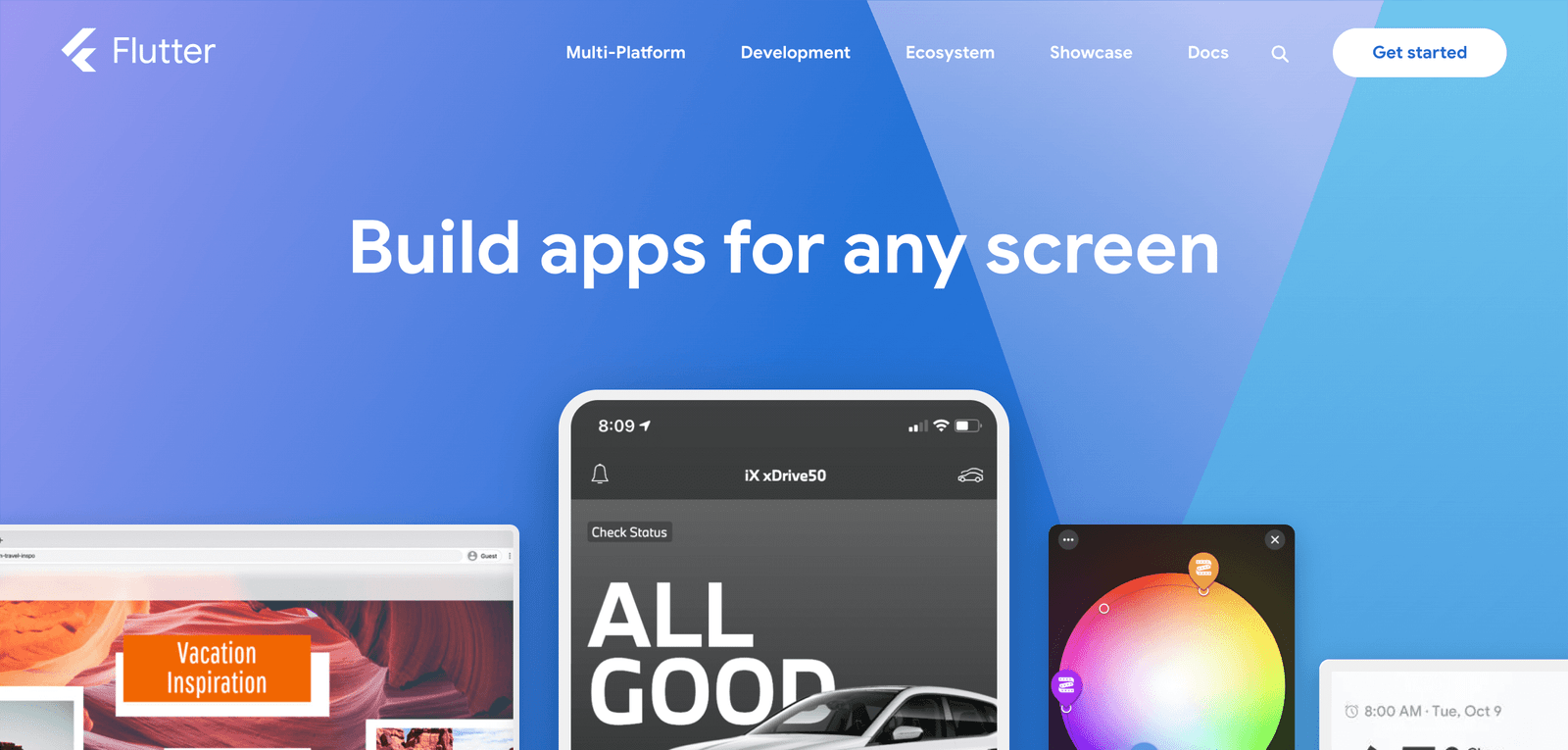
Flutter uses the Dart programming language and provides a reactive programming model that helps developers create beautiful user interfaces quickly. It features a hot reload function that speeds up the development process and allows developers to see the results of code changes instantly. Flutter also offers a rich set of pre-built UI components and extensive documentation.
Ionic
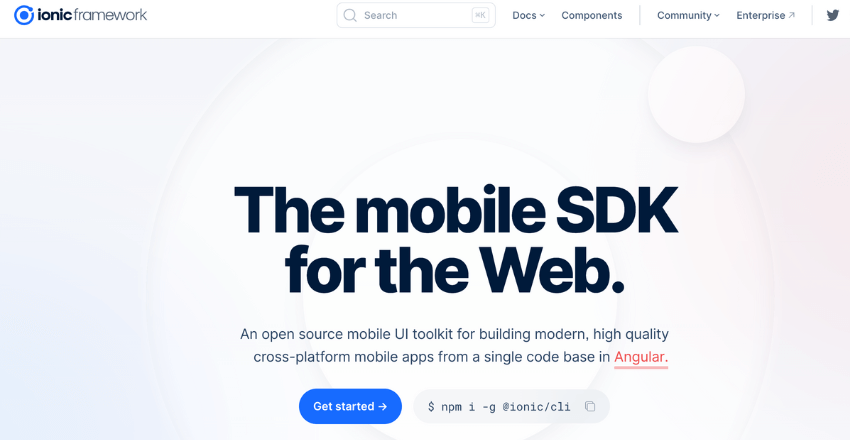
Ionic is built on top of Angular, a popular JavaScript framework for building web applications. It allows developers to use web technologies such as HTML, CSS, and JavaScript to build hybrid mobile apps that look and feel like native apps. Ionic offers a large and active community and provides a comprehensive set of pre-built UI components.
Xamarin
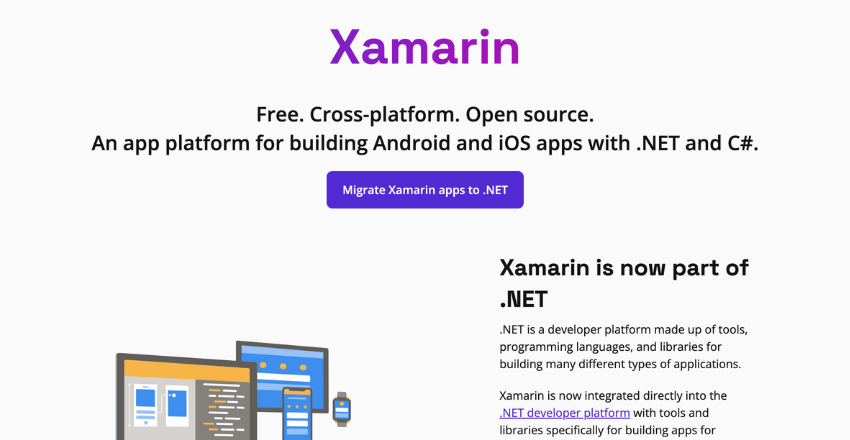
Xamarin uses C# and .NET to develop native mobile apps for iOS, Android, and Windows. It provides a large collection of pre-built UI components and offers seamless integration with Microsoft tools such as Visual Studio and Azure. Xamarin also supports code sharing across multiple platforms, which reduces development time and increases productivity.
Choosing the Right Framework for Your Project
Choosing the right hybrid development framework for your project is a crucial decision that can impact the success of your application. With so many options available, it can be overwhelming to make a choice.
Here are some factors to consider when selecting a framework:
Platform Support
One of the most critical factors to consider is platform support. You want to choose a framework that supports the platforms you are targeting. For example, if you plan to develop an app for both iOS and Android, you need a framework that can handle both platforms efficiently.
Performance
Performance is another essential factor to consider. Some hybrid development frameworks are faster than others, and some even offer near-native performance. It’s important to evaluate the performance of different frameworks and choose one that can meet your performance requirements.
Community Support
Choosing a framework with a strong community of developers can be beneficial in many ways. A robust community means that there are more resources available, such as plugins, libraries, and tutorials, which can help you develop your application faster and with fewer errors.
Learning Curve
The learning curve of a framework is another critical factor to consider. Some frameworks are easy to learn, and developers with a background in web development can quickly pick them up. Others may require more time and effort to learn and may be better suited for experienced developers.
Consider these factors carefully when choosing a hybrid development framework. Taking the time to make the right choice can help you create a successful application that meets your performance, functional, and budgetary requirements.
Hybrid Native vs. Pure Native Development
When it comes to developing mobile applications, developers have the option of using hybrid development frameworks or pure native development. While hybrid development frameworks offer advantages in terms of faster development time and cost-effectiveness, pure native development excels in terms of performance and platform-specific features.
Hybrid development frameworks allow developers to build applications using a single codebase that can be deployed across multiple platforms. This makes it an attractive option for companies with limited resources or those looking to develop applications quickly and cost-effectively.
However, when it comes to performance, pure native development still reigns supreme. Applications built using pure native development have access to platform-specific features that provide a more seamless user experience. Pure native development also allows for better performance optimization, which can make a difference in applications that require real-time data processing or complex animations.
When deciding between hybrid development frameworks and pure native development, it ultimately comes down to the specific needs of the project. Developers must consider factors such as performance requirements, platform-specific features, and available resources before making a decision.
Tips for Optimizing Hybrid Development Performance
Hybrid development frameworks offer a range of advantages, but they can also be prone to performance issues, particularly when compared to native development. Follow these tips to ensure that your hybrid mobile application is optimized for performance:
- Minimize network calls: Network calls can cause delay and affect performance. Make sure that your app minimizes the number of network calls it makes. Caching can help, so try to cache data whenever possible.
- Optimize your code: Poorly optimized code can significantly affect application performance. Make sure that your code is lean and efficient, avoiding unnecessary function calls and loops.
- Use native device features: Hybrid development frameworks offer a range of native device features, such as camera and GPS. Utilizing these features can help to improve app performance and enhance the user experience.
- Use lazy loading: Consider using lazy loading for non-critical components, such as images and videos. This can help to reduce the initial loading time and improve overall app performance.
- Keep your app up-to-date: Make sure that you keep your app up-to-date with the latest versions of your chosen hybrid development framework, as these often include important performance improvements.
- Test your app: Regular testing can help you to identify and fix performance issues. Consider using testing tools to help spot potential bottlenecks and areas for optimization.
By following these tips, you can optimize your hybrid development performance and ensure that your app offers a smooth and seamless user experience.
Resources for Learning and Mastering Hybrid Development Frameworks

Hybrid development frameworks have become an essential tool for developers who wish to build mobile applications that work across multiple platforms. If you’re interested in learning more about hybrid development frameworks and how they can enhance your mobile app development skills, here are some recommended resources:
Online Tutorials
Online tutorials are a great way to get started with hybrid development frameworks. Websites such as Udemy, Udacity, and Coursera offer a range of comprehensive online courses on hybrid development frameworks. Some of the popular courses include React Native, Flutter, and Ionic.
Books
Books remain an excellent resource for learning hybrid development frameworks. Some of the must-read books on hybrid development frameworks include “React Native: Building Mobile Apps with JavaScript”, “Flutter for Beginners: An introductory guide to building cross-platform mobile applications with Flutter and Dart”, and “Ionic Framework: Building Mobile Apps with Ionic”.
Community Forums
Community forums such as Stack Overflow, Reddit, and Quora offer an excellent platform for developers to ask questions and share knowledge on hybrid development frameworks. These forums provide insights on the latest trends, best practices, and common issues related to hybrid development frameworks.
Hybrid Development Framework Documentation
Almost all hybrid development frameworks have documentation available on their official websites. These documents are a great resource for learning how to use the framework, its features, and best practices. You can find detailed documentation on popular hybrid development frameworks such as React Native, Flutter, Ionic, and Xamarin.
Hybrid Development Framework Meetups and Conferences
Attending meetups and conferences on hybrid development frameworks is an excellent way to network, learn, and stay up-to-date with the latest trends and advancements. Meetup.com is a great platform for finding hybrid development framework meetups in your area. Some of the popular hybrid development framework conferences include React Native Europe, Flutter Europe, and AngularConnect.
With these resources, you can learn and master hybrid development frameworks for building cross-platform mobile applications that offer scalability, cost-effectiveness, and a seamless user experience. Happy learning!
Conclusion

Hybrid development frameworks have become an essential tool for developers in today’s mobile app development landscape. They offer numerous benefits, including faster development time, cost-effectiveness, and the ability to leverage existing web development skills.
When choosing a hybrid development framework, developers must consider factors such as platform support, performance, community support, and learning curve. While hybrid development frameworks may not be suitable for all projects, they offer significant advantages over pure native development in many situations.
The future of hybrid development frameworks looks promising, with emerging technologies such as WebAssembly and Progressive Web Apps (PWAs) paving the way for new possibilities. As the demand for cross-platform app development continues to grow, hybrid development frameworks will undoubtedly play a crucial role in meeting this demand.
At Hire Cross Platform, we specialize in providing experienced cross-platform app developers from South America to help you build high-quality, multi-platform hybrid solutions. Contact us today to learn more about how we can help bring your app idea to life.
External Resources
https://dotnet.microsoft.com/apps/xamarin
FAQ

Q: What are hybrid development frameworks?
A: HDFs are software development frameworks that enable developers to build mobile applications that work across multiple platforms, such as iOS and Android. These frameworks combine the use of web technologies, such as HTML, CSS, and JavaScript, with native platform capabilities to create apps that can be deployed on various devices.
Q: What are the benefits of using HDFs?
A: There are several benefits to using HDFs. They allow for faster development time, as a single codebase can be used to build apps for multiple platforms. They are also cost-effective, as it eliminates the need for separate development teams for each platform. Additionally, hybrid development frameworks allow developers to leverage their existing web development skills and easily update apps without requiring users to download updates.
Q: What are some popular hybrid development frameworks?
A: Some popular HDFs include React Native, Flutter, Ionic, and Xamarin. These frameworks offer different features and have various use cases, making them suitable for different types of applications and development requirements.
Q: How do I choose the right hybrid development framework for my project?
A: When choosing a HDF for your project, consider factors such as platform support, performance, community support, and learning curve. Evaluate the specific requirements of your project and research the features and capabilities of different frameworks to determine which one best aligns with your needs.
Q: How do hybrid development frameworks contribute to cross-platform app development?
A: HDFs play a crucial role in cross-platform app development by enabling developers to build applications for multiple platforms using a single codebase. This approach streamlines the development process, reduces costs, and allows for easier maintenance and updates.
Q: What is the difference between hybrid native development and pure native development?
A: Hybrid native development involves using HDFs to build mobile applications that work across multiple platforms, while pure native development involves writing separate codebases for each platform. Hybrid native development offers the advantage of faster development time and cost-effectiveness but may have limitations in terms of performance and access to native platform features.
Q: Can you provide examples of successful apps built with HDFs?
A: Some successful mobile applications built with HDFs include Facebook, Instagram, and Airbnb. These apps showcase the scalability, performance, and user experience that can be achieved using hybrid development frameworks.
Q: How can I optimize the performance of applications built with HDFs?
A: To optimize the performance of applications built with HDFs, consider practices such as code optimization, caching, and leveraging native device features. By optimizing your code and utilizing device capabilities effectively, you can ensure smooth and efficient app performance.
Charlotte Williams is a talented technical author specializing in cross-platform app development. With a diverse professional background, she has gained valuable experience at renowned companies such as Alibaba and Accenture. Charlotte’s journey in the tech industry began as a mobile UX designer back in 2007, allowing her to develop a keen understanding of user-centric app design.
Proficient in utilizing frameworks like React Native and Flutter, Charlotte excels in building cross-platform mobile apps and imparting her knowledge to aspiring developers. She pursued a degree in Computer Science at Cornell University, equipping her with a strong foundation in the field. Residing in San Francisco with her three beloved dogs, she finds solace in hiking the hills and connecting with nature. Charlotte’s passion for app development, combined with her dedication to sharing expertise, makes her an invaluable resource in the world of cross-platform app development.



